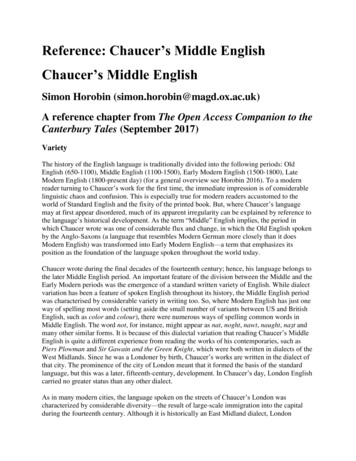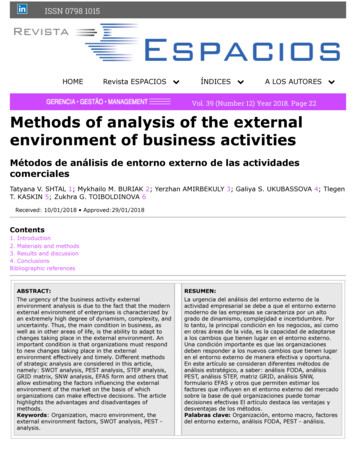
Transcription
English at Work:global analysis of languageskills in the workplaceFull reportNovember 2016In collaboration with
English at Work: global analysis of language skills in the workplaceContents1Introduction. . . . . . . . . . . . . . . . . . . . . . . . . . . . . . . . . . . . . . . . . . . . . . . . . . . . . . . . . . . . . . . . . . . . . . . . . . . . . . . . . . . . . . . . . . . . . . . . . . . . . . . . . . . 42Methodology. . . . . . . . . . . . . . . . . . . . . . . . . . . . . . . . . . . . . . . . . . . . . . . . . . . . . . . . . . . . . . . . . . . . . . . . . . . . . . . . . . . . . . . . . . . . . . . . . . . . . . . . . . 5QS Global Employer Survey. . . . . . . . . . . . . . . . . . . . . . . . . . . . . . . . . . . . . . . . . . . . . . . . . . . . . . . . . . . . . . . . . . . . . . . . . . . . . . . . . . . . . . . 5Industry experts. . . . . . . . . . . . . . . . . . . . . . . . . . . . . . . . . . . . . . . . . . . . . . . . . . . . . . . . . . . . . . . . . . . . . . . . . . . . . . . . . . . . . . . . . . . . . . . . . . . . . . 53Survey participants. . . . . . . . . . . . . . . . . . . . . . . . . . . . . . . . . . . . . . . . . . . . . . . . . . . . . . . . . . . . . . . . . . . . . . . . . . . . . . . . . . . . . . . . . . . . . . . . . . 6Participants by country and territory. . . . . . . . . . . . . . . . . . . . . . . . . . . . . . . . . . . . . . . . . . . . . . . . . . . . . . . . . . . . . . . . . . . . . . . . . . . 6Participants by industry. . . . . . . . . . . . . . . . . . . . . . . . . . . . . . . . . . . . . . . . . . . . . . . . . . . . . . . . . . . . . . . . . . . . . . . . . . . . . . . . . . . . . . . . . . . . 8Participants by organisation size. . . . . . . . . . . . . . . . . . . . . . . . . . . . . . . . . . . . . . . . . . . . . . . . . . . . . . . . . . . . . . . . . . . . . . . . . . . . . . . . 94 Findings. . . . . . . . . . . . . . . . . . . . . . . . . . . . . . . . . . . . . . . . . . . . . . . . . . . . . . . . . . . . . . . . . . . . . . . . . . . . . . . . . . . . . . . . . . . . . . . . . . . . . . . . . . . . . . . 104.1How important are English language skills?. . . . . . . . . . . . . . . . . . . . . . . . . . . . . . . . . . . . . . . . . . . . . . . . . . . . . . . . 104.2 The most important English language skills. . . . . . . . . . . . . . . . . . . . . . . . . . . . . . . . . . . . . . . . . . . . . . . . . . . . . . . . . 164.3 Employers’ English language requirements. . . . . . . . . . . . . . . . . . . . . . . . . . . . . . . . . . . . . . . . . . . . . . . . . . . . . . . . . . 194.4 How many employers have an English language skills gap?. . . . . . . . . . . . . . . . . . . . . . . . . . . . . . . . . . . 224.5 Evaluating English language skills during recruitment. . . . . . . . . . . . . . . . . . . . . . . . . . . . . . . . . . . . . . . . . . . 254.6 Benefits for employees. . . . . . . . . . . . . . . . . . . . . . . . . . . . . . . . . . . . . . . . . . . . . . . . . . . . . . . . . . . . . . . . . . . . . . . . . . . . . . . . . . . 305Future trends. . . . . . . . . . . . . . . . . . . . . . . . . . . . . . . . . . . . . . . . . . . . . . . . . . . . . . . . . . . . . . . . . . . . . . . . . . . . . . . . . . . . . . . . . . . . . . . . . . . . . . . . 34Appendices. . . . . . . . . . . . . . . . . . . . . . . . . . . . . . . . . . . . . . . . . . . . . . . . . . . . . . . . . . . . . . . . . . . . . . . . . . . . . . . . . . . . . . . . . . . . . . . . . . . . . . . . . . . . . . . 36Appendix 1: Full survey questions. . . . . . . . . . . . . . . . . . . . . . . . . . . . . . . . . . . . . . . . . . . . . . . . . . . . . . . . . . . . . . . . . . . . . . . . . . . . . 36Appendix 2: QS Global Employer Survey. . . . . . . . . . . . . . . . . . . . . . . . . . . . . . . . . . . . . . . . . . . . . . . . . . . . . . . . . . . . . . . . . . . 39Acknowledgements. . . . . . . . . . . . . . . . . . . . . . . . . . . . . . . . . . . . . . . . . . . . . . . . . . . . . . . . . . . . . . . . . . . . . . . . . . . . . . . . . . . . . . . . . . . . . . . . . . . . 403
4Introduction1 IntroductionEnglish is spoken at some level by 1.75 billion peopleworldwide – roughly a quarter of the world’s population.1The vast majority of people who use English arenon-native speakers (over 1 billion people).Wherever you are in the world, English is the language of international business,science and research. Over 80% of academic journals2 are written entirely inEnglish.3 An estimated 85% of international organisations use English as one oftheir working languages.4However, despite the ever-increasing prevalence of English in the workplace, therehas been relatively little in-depth research into the English language skills requiredby employers in different industries and countries around the world. What level ofEnglish do employers need? Are there English language skills gaps? Do employeeswith a higher level of English receive enhanced benefits? How do differentcountries and industries compare?Cambridge English and QS have worked together to answer these questionsand more. In this report, we present a global, cross-industry overview of Englishlanguage skills in the workplace.Cambridge English is the global leader in English language assessment. We offera wide range of English language exams, including business English tests. Ourexams are accepted by over 20,000 organisations worldwide as proof of Englishlanguage ability.‘English is the real global language and is important ineducation, relations and business. I am the Chairmanof one of the largest Italian Bank Foundations and weare dealing with more than 100 countries. Our worklanguage is English.’Professor Francesco Profumo, Politecnico di Torino, ItalyVisit our interactive English at Work website to discover more and get detailed analysisfor your industry and country/territory: www.cambridgeenglish.org/english-at-work1 Harvard Business Review (2012) Global Business Speaks English, available online: lish2 Journals in SCOPUS (the world’s largest database of peer-reviewed journals): https://www.scopus.com3 v an Weijen, D (2012) The Language of (Future) Scientific Communication, Research Trends 31, available online: anguage-of-future-scientific-communication4 British Council (2000) The Future of English?, available online: re-of-english-en.pdf
5Methodology2 MethodologyThe findings in this report are based on data from theannual QS Global Employer Survey and insights fromindustry experts.QS Global Employer SurveyThe QS Global Employer Survey has been running since 1990. Its main aim is tofind out employers’ opinions on the quality of university graduates. In 2016, QSand Cambridge English introduced a series of questions about English languageskills in the workplace.5The survey was live between 1 April and 31 July 2016. The questions about Englishlanguage skills were answered by 5,373 employers, in 38 countries/territories and20 different industries.6Industry expertsThroughout this report, the survey findings are supported by qualitative industryinsights. These insights were provided by: Cambridge English experts7 a sample of employers who took part in the QS Global Employer Survey.5 The series of survey questions about English language skills is provided in Appendix 1.6 Further survey methodology details, such as sampling and filtering procedures, are provided in Appendix 2.7 Details about the interviewed employers, Cambridge English experts and report contributors are provided in the Acknowledgements (page 40).
6Survey participants3 Survey participantsParticipants by country and territoryThis report presents a country-by-country comparison of English language skillsin the workplace. Countries and territories with survey responses from at least20 employers have been included in this analysis.Countries and territories have been categorised into: countries and territories where English is not an official language countries and territories where English is an official or de facto official language English-speaking countries, where English is the first language of the majority ofthe population.Table 1: Countries/territories included in this report (survey responses received from at least 20 employers)Countries/territories whereEnglish is not an es whereEnglish is an official or defacto official languageSurveyresponsesEnglish-speaking d States174Russia470India72United Kingdom151South Korea381Singapore53Australia123Brazil279Hong Kong32Canada92Kazakhstan200Ireland43Japan160New nd25Iraq24Jordan23Belgium22Denmark20Saudi Arabia20Colombia20
English at Work: global analysis of language skills in the workplace7BRIC (Brazil, Russia, India, China)The survey received a high proportion of responses from BRIC countries (three ofthe top four countries). The highest number of responses was from employers inChina (1,643 responses), the second highest was from employers in Russia (470responses), while Brazil was ranked fourth (279 responses).Using the World Bank’s classification of countries8, we can see that the majority ofsurvey responses have been provided by employers from high and middle incomecountries and territories: 36% of responses are from employers in high income countries and territories 63% of responses are from employers in middle income countries and territories 0.1% of responses are from employers in low income countries and territories.** Not classified: 0.9%.Regional participationThe survey received responses from employers all around the world, with thelargest number of responses coming from East Asian countries and territories.Table 2: Percentage of survey responses from each region9Region% of survey responses10East Asia and Pacific50%Europe and Central Asia28%Latin America and the Caribbean12%North America5%Middle East and North Africa3%South Asia2%Sub-Saharan Africa1%8 World Bank Country Groups: ps9 World Bank Country Groups: ps10 Throughout this report figures are displayed to zero decimal points. Consequently the sums of some rows and columns are 99% or 101% rather than 100%.
nts by industryThis report also presents an industry-by-industry comparison of English languageskills in the workplace. As before, industries with survey responses from at least20 employers have been included in this analysis.Table 3: Industries included in this report (survey responses received from at least 20 employers)Industries*Surveyresponses% of responses from countries/territories where English is not anofficial language% of responses from English-speakingcountries and countries/territorieswhere English is an official or de factoofficial languageConsulting / Professional Services72980%20%IT / Computer Services52883%17%Manufacturing / Engineering48377%23%Construction / Property36991%9%Financial Services / Banking34274%26%Pharmaceuticals / Biotech &Healthcare30077%23%Recruitment / HR Services28990%10%Public Sector / Government /Not-for-profit28677%23%Energy19279%21%Electronics / High Technology15578%22%Transportation / Distribution14392%8%Travel / Leisure / Hospitality13783%17%FMCG(Fast Moving Consumer Goods)12592%8%Media / Entertainment & 7%23%Metals / Mining6087%13%Aerospace / Defence5070%30%Utilities3190%10%* Other industries: 751 responses (countries/territories where English is not an official language: 94%; English-speaking countries and countries/territorieswhere English is an official or de facto official language: 6%).
English at Work: global analysis of language skills in the workplace9Participants by organisation sizeSurvey participants were also asked to provide information about theirorganisation’s size. The largest number of responses was from small businesses(10–99 employees) and large enterprises (more than 2,500 employees).Table 4: Survey responses by organisation sizeOrganisation size*(number of employees)Surveyresponses% of responses from countries/territories where English is not anofficial language% of responses from English-speakingcountries and countries/territorieswhere English is an official or de factoofficial languageMicro business(1–9 employees)80084%17%11Small business(10–99 employees)1,32080%20%Medium-sized business(100–499 employees)87981%19%Mid–large-sized business(500–999 employees)56688%12%Enterprise business(1,000–2,499 employees)52888%12%Large enterprise(More than 2,500 employees)1,26181%19%* No size given: 18 responses (countries/territories where English is not an official language: 94%; English-speaking countries and countries/territories whereEnglish is an official or de facto official language: 6%).All organisation sizes received a similar proportion of responses from employerslocated in countries/territories where English is not an official language (80–88%)and employers located in English-speaking countries and countries/territorieswhere English is an official or de facto official language (12–20%).The highest proportion of responses from employers located in countries/territories where English is not an official language came from mid–large-sizedbusinesses (500–999 employees) and enterprise businesses (1,000–2,499employees).11 Throughout this report figures are displayed to zero decimal points. Consequently the sums of some rows and columns are 99% or 101% rather than 100%.
10Findings4 Findings4.1 How important are English language skills?Key findingsEnglish is immensely important wherever you are in the world. In countries andterritories where English is not a native or official language, over two thirds ofemployers say that English is important for their business.English is the language of international business,so increasingly it is just as important for businessesin native and non-native English-speaking countries.The survey shows that English language skills areimportant for over 95% of employers in many countriesand territories where English is not an official language.Findings by language statusIn countries and territories where English is not an official language, 69% ofemployers said that English is significant12 for their organisation. In countries andterritories where English is an official or de facto official language, this increasedto 97% of all employers.Overall, English is important to the majority of employers in countries andterritories where English is not an official language, but they were less likelyto say that it is extremely important or the main language used.Responses included in the analysisPlease note that the findings in following sections 4.2, 4.3, 4.4, 4.5 and 4.6 arebased on the responses received from the employers who said that English issignificant to their organisation.‘We serve predominantly foreign clients withdifferent languages and cultures. It is essential for usto communicate effectively and clearly. English is thecommon denominator.’Pratik A Narsingpura, Business Advisory, SKP Business Consulting LLP, India12 ‘Significant’ includes the following responses: ‘English is the main language used’, ‘Extremely important’, ‘Very important’, ‘Important’.
English at Work: global analysis of language skills in the workplace11Graph 1: % of employers that said English is important –language status comparison*6%Not important1%0%23%Not very important1%1%26%Important10%3%18%Very important11%5%14%Extremely important22%17%English is the mainlanguage used11%54%72%* The remaining respondents answered ‘Don’t know’ or ‘Not applicable’.Countries/territories where English is not an official languageCountries/territories where English is an official or de facto official languageEnglish-speaking countries
12www.cambridgeenglish.org/english-at-workFindings by country and territoryEnglish is important for over 95% of employers in many countries and territorieswhere English is not an official language, such as Belgium, Germany, Italy, Portugaland Switzerland.The countries and territories least likely to say that English is important were: L atin American countries: Brazil, Chile and Venezuela are among the fivecountries and territories least likely to say that English is important. In addition,Colombia, Argentina and Mexico all feature towards the low end of the list. BRIC countries: Brazil, Russia and China are all among the five countries andterritories least likely to say that English is important.Although these countries and territories feature towards the low end of the list,at least 50% of all employers (apart from in Chile) still say that English isimportant for their organisation.Country case study: IndiaIndia is different from the other BRIC countries. Over 85% of employers say thatEnglish language skills are important for their organisation. This result may reflectIndia’s historical connections to English-speaking countries.Today, English is an official language in India. However, it is not always widely spokenthroughout the country – it can be a first, second or foreign language. TeachingEnglish to primary school children has been a controversial matter, both politicallyand pedagogically.However, among parents there is a strong demand for English, and the early yearsof schooling aim to develop proficiency in English as a base for later academic orprofessional language use.
English at Work: global analysis of language skills in the workplace13Graph 2: % of employers that said English is significant13 for their organisation –country/territory comparisonGermany100%Ireland100%New apore98%United 96%Belgium96%United States95%Jordan91%Hong Kong91%India90%Denmark90%Saudia pt82%Spain81%South 61%Venezuela56%Chile48%Countries/territories where English is not an official languageCountries/territories where English is an official or de facto official languageEnglish-speaking countries13 ‘Significant’ includes the following responses: ‘English is the main language used’, ‘Extremely important’, ‘Very important’, ‘Important’.
14www.cambridgeenglish.org/english-at-workFindings by industryIn countries and territories where English is not an official language, the industriesleast likely to say that English is important (with less than two thirds of employerssaying that English is significant for their organisation) were: Construction and Property Recruitment and HR Services Retail.Graph 3: % of employers that said English is significant14 for their organisation –industry comparison89%93%Aerospace / tation / DistributionManufacturing / Engineering76%Electronics / High Technology76%100%97%97%75%Travel / Leisure / HospitalityConsulting / Professional Services74%IT / Computer Services73%Pharmaceuticals / Biotech & Healthcare73%100%98%97%94%72%Financial Services / BankingMetals / Mining69%Public Sector /Government / Not-for-profit69%98%100%99%68%UtilitiesMedia / Entertainment & Arts66%FMCG66%Retail60%Recruitment / HR Services60%Construction / ries where English is not an official languageEnglish-speaking countries and countries/territories where Englishis an official or de facto official language14 ‘Significant’ includes the following responses: ‘English is the main language used’, ‘Extremely important’, ‘Very important’, ‘Important’.100%
English at Work: global analysis of language skills in the workplace15Findings by organisation sizeIn countries and territories where English is not an official language, largeenterprises (with more than 2,500 employees) were most likely to say thatEnglish is important. However, there is surprisingly little variation. English isimportant to at least two thirds of all employers across all organisation sizes.Graph 4: % of employers that said English is significant15 for their organisation –organisation size comparisonMicro business(1–9 employees)68%Small business(10–99 employees)68%Medium-sized business(100–499 employees)Mid–large-sized business(500–999 employees)Enterprise business(1,000–2,499 employees)Large enterprise(2,500 territories where English is not an official languageEnglish-speaking countries and countries/territories where Englishis an official or de facto official languageVisit our interactive English at Work website to discover more and get detailed analysisfor your industry and country/territory: www.cambridgeenglish.org/english-at-work15 ‘Significant’ includes the following responses: ‘English is the main language used’, ‘Extremely important’, ‘Very important’, ‘Important’.
16www.cambridgeenglish.org/english-at-work4.2 The most important English language skillsKey findingsEmployers say it is important to have proficiency in all four language skills(reading, writing, speaking and listening). However, the most important languageskill is reading (in 12 industries), followed by speaking (in eight industries).Reading in English is essential for maintaining professional knowledge, as it’sthe language most often used in international journals, contracts and instructions.Speaking tends to be the most important skill in service industries such as Travel,Leisure and Hospitality, where social interaction is a big part of the job.Findings by language statusAcross all countries and territories, the most important skills were reading andspeaking. The most important skill for employers in countries/territories whereEnglish is not an official language was reading. However, for employers in Englishspeaking countries and countries/territories where English is an official or de factoofficial language, it was speaking.Graph 5: The English language skill employers said was most important fortheir organisation – language status comparison16, 24%11%Writing16%15%Countries/territories where English is not an official languageCountries/territories where English is an official or de facto official languageEnglish-speaking countries16 Respondents who did not answer this question are not included in this analysis.17 Throughout this report, all graphs are presented to zero decimal places. This may result in some totals adding to 101% or 99%.
English at Work: global analysis of language skills in the workplace‘17Today, English is the only language that provides uswith the latest knowledge. It is the language of business,science, etiquette and innovations.’Nurbek Achilov, Founder, Board Member and Managing Director, G-GlobalDevelopment Community, KazakhstanFindings by country and territoryThere are no strong regional patterns regarding the skill which is most importantto employers. For example: Europe: Reading is the most important skill for approximately half of all theemployers in Belgium, Denmark, France, Germany, Portugal, Russia and Ukraine.However, speaking is the most important skill for employers in Italy, Lithuania,Spain and Switzerland. East Asia: Reading is the most important skill for approximately half of all theemployers in Hong Kong, Japan and South Korea. However, speaking is the mostimportant skill for employers in China.Findings by industryAcross all industries, the most important skill for employers was either reading(12 industries) or speaking (eight industries). Reading is most important toemployers in: Electronics and High Technology IT and Computer Services Aerospace and Defence.Speaking is most important to employers in: Travel, Leisure and HospitalityTransportation and DistributionRecruitment and HR ServicesRetail.Industry case study: Research and development rolesSome of the employers provided additional insights (after they had completed thesurvey). They stressed the importance of writing in certain job roles, in particular,for staff involved in research and development. Publication quantity and qualityis one of the main factors when distributing grant money. Over 80% of academicjournals18 are written entirely in English.1918 Journals in SCOPUS (the world’s largest database of peer-reviewed journals): https://www.scopus.com19 v an Weijen, D (2012) The Language of (Future) Scientific Communication, Research Trends 31, available online: anguage-of-future-scientific-communication
tists must be able to read, communicate and,most importantly, write in English because publicationsare the main measure of the outcome.’Vsevolod Makeev, Faculty Member, Vavilov Institute of General Genetics, RussiaFindings by organisation sizeThere is a clear trend in the results by organisation size. For larger organisations,reading is increasingly likely to be the most important skill. Conversely, for smallerorganisations, speaking becomes more important.Large multinational companies are likely to have offices and employeesin many different geographical locations and time zones. Co-workers oftencan’t meet in person and rely on different forms of written communication,such as email, so it’s even more important to use a common language to avoidpotential miscommunication.Employees in businesses spread across fewer locations are likely to havemore opportunities to speak face to face. Furthermore, with smaller numbersof employees, it is more feasible for the whole team to interact directly.Visit our interactive English at Work website to discover more and get detailed analysisfor your industry and country/territory: www.cambridgeenglish.org/english-at-work
English at Work: global analysis of language skills in the workplace194.3 Employers’ English language requirementsKey findingsThere is a wide range of English requirements in countries/territories whereEnglish is not an official language, with 7% of job tasks requiring native-levelEnglish, 49% requiring advanced English, 31% requiring intermediate Englishand 9% requiring basic English.20‘The highest English language requirements are in business sectors, such asBanking, Finance and Law, where business publications tend to use complex andtechnical English. Language requirements are lower in Travel, Leisure, Hospitality,Transportation, Distribution and Utilities, possibly because customer-facing rolestend to use more everyday English and issues in understanding can be resolvedwith relatively simple English.I think that English requirements for staff will remain ona high level. We are participating in joint research projects[and] the quality of scientific work is significantly improved.’Igor Garkusha, Science Director, Institute of Plasma Physics, National ScienceCenter, UkraineFindings by language statusIn English-speaking countries, the majority of employers require a native levelof English or an advanced level of English. However, in countries/territories whereEnglish is not an official language, most employers tend to require either advancedor intermediate-level English.Findings by country and territoryThere are some interesting trends in the regional results. In many East Asiancountries and territories where English is not an official language, such as China,Japan and South Korea, approximately half of all jobs require either intermediateor basic-level English. However, in many European, Central Asian and MiddleEastern countries and territories, there is a much bigger demand for advancedlevel English.East Asian countries and territories have some of the lowest English languagerequirements. However, countries/territories in this region were also most likelyto report that a high proportion of their current workforce have an English languageskills gap. In contrast, many European employers said they have no skills gaps,and countries/territories in this region have some of the highest Englishlanguage requirements.The survey findings indicate that English language requirements are influenced bythe skills that are actually available. Employers’ English language requirements are,in part, about being pragmatic.20 The remaining respondents answered ‘Don’t know’ or ‘Not applicable’
20www.cambridgeenglish.org/english-at-workFindings by industryIn Media, Entertainment and Arts, Law, Financial Services and Banking, over afifth of all jobs require native-level English. However, it is worth noting that theseindustries received a higher proportion of responses from employers located inEnglish-speaking countries and countries/territories where English is an officialor de facto official language.Other industries, such as Construction and Property, FMCG, Recruitment and HRServices, Transportation and Distribution, and Utilities, received a high proportionof responses from employers located in countries where English is not an officiallanguage. These industries were more likely to require a mixture of advanced andintermediate-level skills.See Graph 6 on the next page.Findings by organisation sizeEnglish language requirements are very similar across all organisation sizes,with approximately half of employers requiring advanced-level English. Largeenterprises are most likely to require native or advanced-level English (two thirdsof all roles).Company case study: RakutenIncreasing numbers of multinational companies are
employers say that English is important for their business. English is the language of international business, so increasingly it is just as important for businesses in native and non-native English-speaking countries. The survey shows that English language skills










